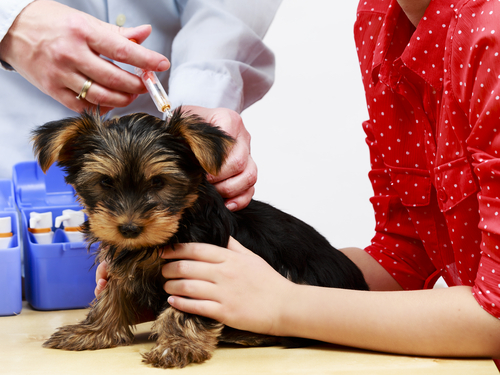
Photo: Shutterstock
For many people pets are a beloved part of the family. A sick pet can cause worry and disrupt the daily routine, and the illness may even be fatal. However, just like with humans, certain communicable diseases can be prevented by immunizing our pets. In addition, vaccination for pets also protect pet owners against some infectious diseases that are transferrable to humans. If you have a new puppy or kitten, it’s important that you get it checked by your vet who will inform you of the necessary shots.
diseases can be prevented by immunizing our pets. In addition, vaccination for pets also protect pet owners against some infectious diseases that are transferrable to humans. If you have a new puppy or kitten, it’s important that you get it checked by your vet who will inform you of the necessary shots.
Puppies and kittens are generally protected from disease early in their lives by antibodies present in their mothers’ milk. However, this is only the case if the mother has also been properly vaccinated or carries the antibodies through exposure to the germs. Once the young have been weaned, they will need protection against infection by way of vaccinations. Here are points to keep in mind regarding vaccinating pets.
When to vaccinate
Dogs need to be vaccinated when they are between eight and ten weeks old. Kittens should be given their shots at nine to twelve weeks old. Pets then generally have to take a booster a year after they have initially been vaccinated. As your pet grows older, their immunity can start to lower and your vet will be able to guide you on the regularity and type of shots needed. This will depend on your animal’s needs and the diseases they may be susceptible to according to where you live.
What vaccines are needed
Puppies are commonly vaccinated against disease such as the canine parvovirus, canine distemper virus, leptospirosis, infectious canine hepatitis, corona viral enteritis and canine parainfluenza at eight to ten weeks. They are vaccinated against rabies at three months of age.
Kittens need vaccine protection against rabies, feline infectious enteritis, feline herpes virus, feline leukaemia virus and feline calicivirus.
Protection takes time
Once your pet has been inoculated, immunization against the disease is not immediate. In order for the vaccine to be effective, the injected antigens (foreign substance that provokes the immune response) have to alert the immune system, which then responds by producing antibodies against the disease. Usually, the process takes a few days to start after the shot and become an ingrained response. Puppies usually only benefit from the full protection of a vaccine starting from about fourteen days after they have been immunized. So it’s best to be careful not to put your pet in a situation where they could be at risk (contact with un-immunized animals) until at least a couple of weeks after being vaccinated.
Share your thoughts, leave a comment below. Please like FamiLife’s page on Facebook so that you get all our articles and others may find us.
so that you get all our articles and others may find us.
